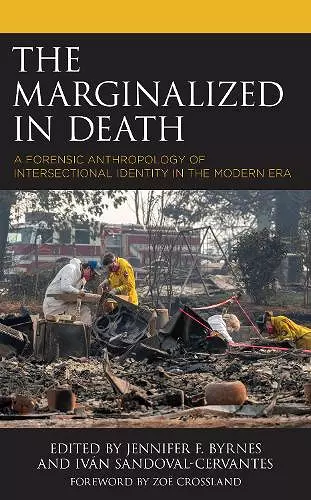The Marginalized in Death
A Forensic Anthropology of Intersectional Identity in the Modern Era
Jennifer F Byrnes editor Iván Sandoval-Cervantes editor
Format:Paperback
Publisher:Lexington Books
Published:15th Mar '24
Should be back in stock very soon

This volume bridges the gap between forensic and cultural anthropology in how both disciplines describe and theorize the dead, highlighting the potential for interdisciplinary scholarship. As applied disciplines dealing with some of the most marginalized people in our society, forensic anthropologists have the potential to shed light on important and persistent social issues that we face today. Forensic anthropologists have successfully pursued research agendas primarily focused on the development of individual biological profiles, time since death, recovery, and identification. Few, however, have taken a step back from their lab bench to consider how and why people become forensic cases or place their work in a larger theoretical context. Thus, this volume challenges forensic anthropologists to reflect how we can use our toolkit and databases to address larger social issues and quandaries that we face in a world where some are spared from becoming forensic anthropology cases and others are not. As witnesses to violence, crimes against humanity, and the embodied consequences of structural violence, we have the opportunity—and arguably, the responsibility—to transcend the traditional medico-legal confines of our small sub-discipline, by synthesizing forensic anthropology casework into theoretically grounded social science with potentially transformative impacts at a global scale.
Taken collectively, the chapters in this volume effectively demonstrate how a forensic anthropology informed by social theorizing makes visible violences (political, structural, symbolic, everyday, posthumous) experienced by certain marginalized and vulnerable groups. Authors’ case studies—about undocumented migrants, rural villagers, gender-diverse individuals, the urban poor and houseless, victims of natural disaster, deceased military personnel, opioid users—are sure to instigate needed policy changes, as well as help realize a praxis that is more compassionate and ethical.
-- Pamela L. Geller, University of MiamiA superb collection of essays making an important and timely connection between forensics and cultural anthropology. The Marginalized in Death pushes our understanding of the lives of vulnerable populations in new directions while simultaneously making the much needed argument that we can no longer imagine a forensic science that is not in deep conversation with ethnography.
-- Jason De León, Executive Director of the Undocumented Migration Project and author of The Land of Open Graves: Living and Dying on the Migrant TrailThis committed group of scholars and scientists explores the many reasons why some bodies are more vulnerable than others to preventable deaths, disappearance, and erasure--including the erasure of histories, identities, and basic dignity through forensic casework. In response, they offer clear, necessary steps towards more ethical deathwork and more rigorous ways of knowing the dead.
-- Adam R. Rosenblatt, Duke University; author of Digging for the Disappeared: Forensic Science after AtrocityThis field-defining volume demonstrates how forensic anthropology is uniquely positioned as both a tool for making visible direct violence perpetrated against the living and a discipline capable of revealing how more insidious forms of violence—structural violence, postmortem violence, and the violence of stigmatization—harm entire communities long before and long after death. The insights regarding how violence operates and how it changes the human body make this a must-read for scholars of mass violence, medical anthropology, and the sociology of health and illness.
-- Robin C. Reineke, University of AriISBN: 9781666923117
Dimensions: 228mm x 151mm x 21mm
Weight: 503g
384 pages